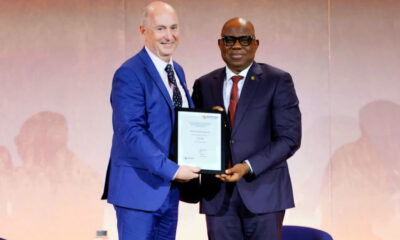Business
Nigeria bleeding from rising petrol smuggling, says NNPC GMD

About 42 million litres of petrol are being smuggled out of Nigeria daily through the borders, the Nigerian National Petroleum Corporation has lamented.
The corporation said the country was bleeding from such huge amount of fuel smuggling, which had increased daily consumption of petrol from 60 million litres to 102 million litres.
The NNPC Group Managing Director, Mallam Mele Kyari, stated this in Abuja when he met with stakeholders, adding that smuggling had gone beyond what the NNPC could handle.
This is contained in a statement by the corporation’s General Manager, Public Affairs, Dr Taiye Obateru.
He also put the subsidy on petrol being paid by the government every month at N150bn, a situation meant to keep the pump price of petrol at N162 per litre.
Those that attended the meeting were the leaderships of the Department of State Services (DSS), Nigeria Customs Service (NCS), he Economic and Financial Crimes Commission (EFCC) and chief executives of agencies in the Ministry of Petroleum Resources.
Other groups that attended the stakeholders’ meeting organised by the corporation to halt fuel smuggling were the Independent Petroleum Marketers Association of Nigeria (IPMAN), the National Association of Road Transport Owners (NARTO), Petroleum Tanker Drivers (PTD), Major Oil Marketers Association of Nigeria (MOMAN), Depot and Petroleum Marketers Association (DAPPMA).
Kyari said fuel smuggling was increasing the country’s subsidy payment and exacerbating the foreign exchange crisis.
He said the gathering was at the instance of President Muhammadu Buhari who mandated the Ministry of Petroleum Resources, the NNPC, the EFCC and all other security agencies to do everything possible to stop crude oil theft and illicit truck-out of petroleum products, which he described as major economic crimes that have hindered Nigerians from enjoying the benefits of subsidised petroleum products.
He urged all industry stakeholders to collaborate with the NNPC to ensure that the daily national petroleum products consumption, which shot up to 102 million litres in May, is reduced to about 60 million litres.
He added that it was obvious that that huge volume of petrol was not consumed by Nigerians alone.
Kyari said, “We all agree that smuggling is not a business that should be condoned because even for deregulated petroleum products, it brings extra cost burden on this country both in terms of safety and security of supply and in securing of foreign exchange.
“It even constitutes more burden to this country when the product involved is a regulated product like Premium Motor Spirit (PMS).”
He noted that with the increasing price of crude oil at the global market and the OPEC+ production cuts, the country could not afford to shoulder the cost of smuggling.
“We all know that our daily consumption is not up to 60 million litres. We all know that, and that is why we have to pull it down. We will pull it down by every means necessary,” he said.
He said the NNPC would introduce advanced cargo declaration in line with global best practices to tackle crude oil theft.
Kyari stated that going after smugglers was beyond the call of the corporation, adding that with the involvement of the EFCC, the situation would improve considerably.
“But we in the NNPC, we are not in control of that, we are not in every depot, we don’t keep products in all the depots, but when the volume goes down, it comes down to us. When there is tight supply, it comes back to the NNPC and we solve the problem,” he added.
Kyari said, with the extant directive from the President that smuggling had to be halted, all the stakeholders must begin to work together to address the problem, especially with the involvement of the security agencies.
He said Buhari had instructed that the menace must be stopped by every means necessary, and called on the stakeholders present to think outside the box since all the layers of controls that had been put in place before now seemed to have failed.
He stated that with the current exchange rate and considering other price determinants, the pump price of petrol should be N256 per litre.
“What we sell today is N162; so the difference is at a cost to the nation,” he said.
Kyari said, “I know that so much work is going on, and then we have to manage the volume that we are exposed to between this price of N162 and N256. The difference comes back to as much as N140bn to N150bn cost to the country monthly.
“And as long as the volume goes up, that money continues to increase and we have two sets of stress to face, the stress of supply and the stress of foreign exchange for the NNPC.”
Minister of State, Petroleum Resources, Chief Timipre Sylva, also said, “We brought in the big hammer, and the big hammer as you can see is the EFCC because it is economic sabotage and I believe with the EFCC in the picture, the system will work even better.”
Chairman of the EFCC, Abdulrasheed Bawa, said smuggling of petroleum products was worrisome, and assured Nigerians that the EFCC was fully committed to the special operation, codenamed “Operation White” designed to check illegal exportation.
He said since part of the commission’s duty was to ensure the reduction of financial crime, the EFCC would do all it could to stop smuggling.
Business
NNPC Raises Petrol Price to ₦933 in Lagos, ₦960 in Abuja
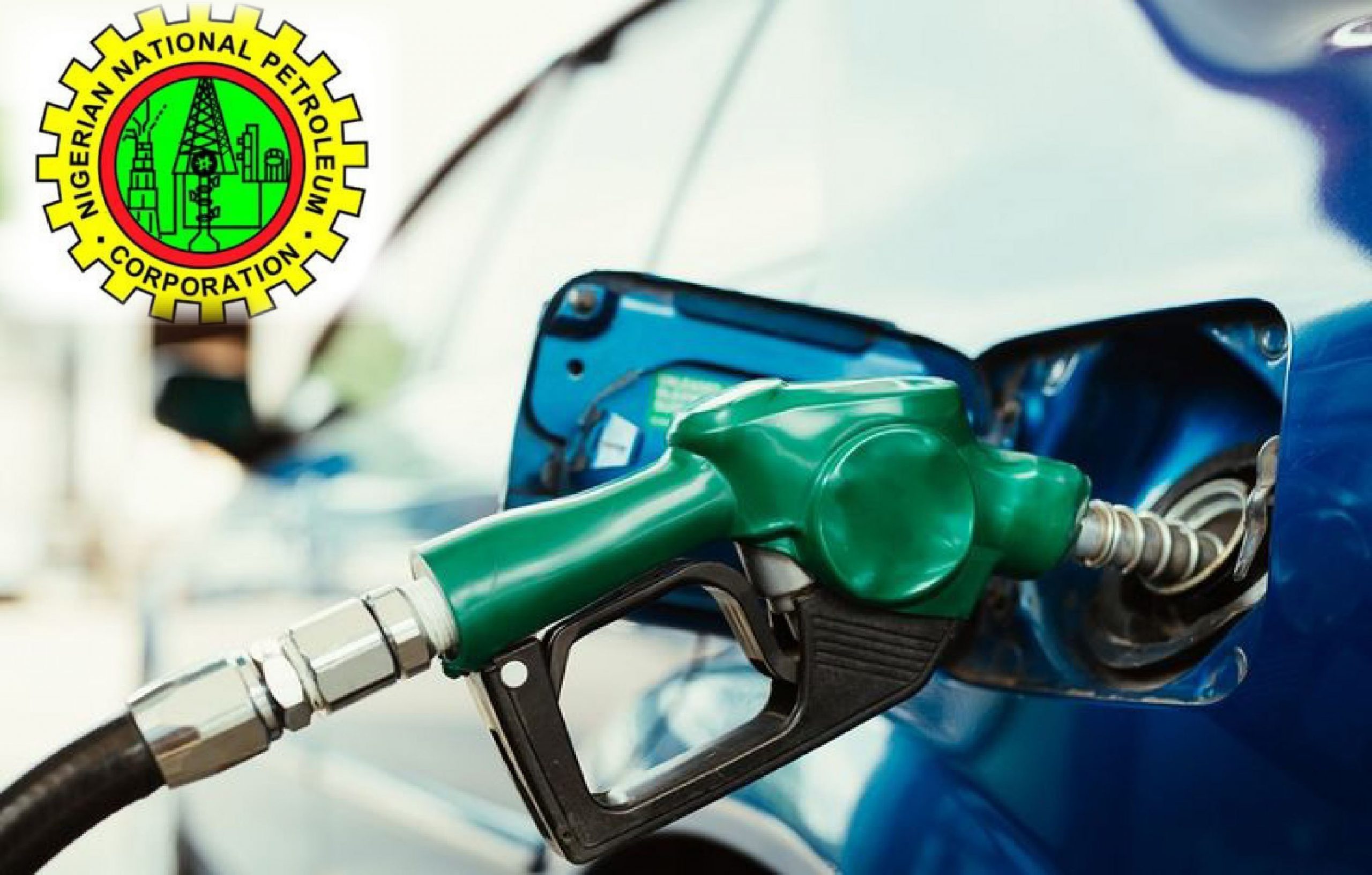
NNPC Raises Petrol Price to ₦933 in Lagos, ₦960 in Abuja
The Nigerian National Petroleum Company Limited (NNPC) has increased the pump price of petrol at its retail stations to ₦933 per litre in Lagos and ₦960 per litre in Abuja, triggering fresh concerns among motorists and businesses over rising fuel costs in Nigeria.
The national oil company raised the price by ₦103 in Lagos, moving from ₦830 per litre to ₦933, while motorists in the federal capital Abuja now pay ₦960 per litre, representing an ₦85 increase from the previous ₦875 price.
Checks on Wednesday showed that the new petrol price has already been implemented at several NNPC retail outlets, including stations at Apple Junction and Ago Palace Way in Lagos, while stations along Airport Road in Lugbe, Abuja, were dispensing petrol at the new ₦960 rate.
The latest fuel price hike comes shortly after the Dangote Petroleum Refinery increased its ex-gantry petrol price to ₦874 per litre on March 2, up from ₦774 per litre, a development that has influenced retail pricing across the downstream petroleum sector.
Industry analysts say the rise in petrol prices in Nigeria is closely linked to growing geopolitical tensions in the Middle East, which have unsettled global energy markets and pushed up crude oil prices.
READ ALSO:
- Yul Edochie Blasts Arise TV Anchor Rufai Oseni in Viral Video
- Court Discharges Abba Kyari, Brothers in NDLEA Non-Disclosure of Assets Case
- Kano State House of Assembly Initiates Impeachment Proceedings Against Deputy Gov
Recent market data shows that Brent crude oil rose to about $85 per barrel on March 3, compared with around $72 per barrel recorded on February 28, intensifying pressure on petrol landing costs for markets that still rely partly on imports.
Experts note that Nigeria’s deregulated fuel market means pump prices now fluctuate in response to international oil prices, exchange rate volatility, and supply chain costs.
Meanwhile, the Petroleum Products Retail Outlets Owners Association of Nigeria (PETROAN) has called on the federal government to ensure steady crude oil supply to domestic refineries, particularly as Nigeria seeks to strengthen local refining capacity.
The association warned that continued instability in global oil markets could weaken the naira, raise petrol prices further, and push inflation higher, thereby worsening the cost-of-living challenges faced by Nigerians.
Energy stakeholders have also stressed the importance of expanding local refining operations, including production from the Dangote refinery and rehabilitation of government-owned refineries, to reduce dependence on imported fuel.
The latest price adjustment reflects the ongoing transition in Nigeria’s downstream petroleum sector following the removal of fuel subsidies and the adoption of a market-driven pricing system.
Motorists across Lagos, Abuja and other major cities have expressed concern that rising petrol prices could increase transportation costs, food prices and overall inflation, placing additional pressure on households and businesses.
NNPC Raises Petrol Price to ₦933 in Lagos, ₦960 in Abuja
Business
TCAN Targets Logistics Reforms to Drive Economic Growth at 2026 Transport Summit
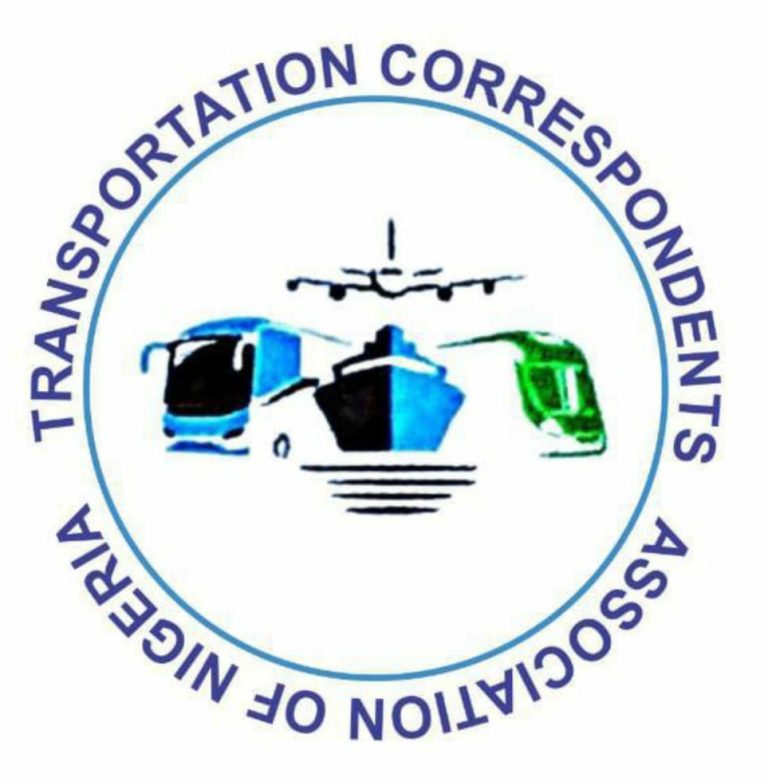
TCAN Targets Logistics Reforms to Drive Economic Growth at 2026 Transport Summit
The Transportation Correspondents Association of Nigeria (TCAN) has begun preparations for its 2026 Annual Transport Summit, placing Nigeria’s logistics value chain at the centre of national economic discourse.
Scheduled for September 2026 in Lagos, the summit will be held under the theme, “Unlocking Economic Growth Through Transportation Logistics.”
It is expected to draw major stakeholders across the aviation, maritime, rail and road transport sectors, alongside logistics service providers, policymakers, regulators, development partners and financial institutions.
In a statement, TCAN said the summit would critically examine how efficient transportation logistics can serve as a catalyst for sustainable economic growth, trade facilitation, job creation and regional integration, especially in the context of ongoing reforms and infrastructure investments within the sector.
Chairman of TCAN, Tola Adenubi, described transportation logistics as the backbone of economic development, stressing that the performance of Nigeria’s logistics ecosystem directly impacts the nation’s competitiveness.
“From cargo handling at airports and seaports to inland freight movement and last-mile delivery systems, the efficiency of Nigeria’s logistics architecture plays a decisive role in determining the competitiveness of the nation’s economy,” Adenubi said.
He noted that the 2026 summit would explore innovative strategies to strengthen the sector, including digital transformation, infrastructure financing models, public-private partnerships and regulatory reforms aimed at optimising performance.
Chairman of the 2026 Conference Committee, Suleiman Idris, said the summit would feature high-level panel discussions, keynote addresses and interactive sessions designed to assess the current state of Nigeria’s transportation logistics framework.
According to him, deliberations will focus on identifying bottlenecks hindering seamless cargo and passenger movement, examining the impact of multimodal transport integration on economic expansion, and highlighting investment opportunities within the logistics and supply chain ecosystem.
Idris added that experts at the summit would also provide policy recommendations targeted at enhancing operational efficiency and boosting Nigeria’s global competitiveness in trade and transportation.
As part of the programme, TCAN will confer its Champions of Transport Industry Development (COTID) certificates on selected government agencies and private operators that have made significant contributions to the advancement of Nigeria’s transportation sector.
Over the years, the TCAN Annual Transport Summit has evolved into a credible platform for constructive engagement between regulators, operators and other industry stakeholders.
The association said the 2026 edition aims to deepen policy conversations, promote transparency and accountability, and accelerate reforms capable of unlocking the full economic potential of Nigeria’s transport and logistics industry.
With logistics increasingly recognised as a key enabler of economic growth, industry observers expect the 2026 summit to set the tone for fresh strategies that could reshape Nigeria’s transportation landscape in the years ahead.
Business
Petrol Jumps to ₦937 in Lagos, ₦975 in Abuja Amid Middle East Oil Crisis

Petrol Jumps to ₦937 in Lagos, ₦975 in Abuja Amid Middle East Oil Crisis
Nigeria’s fuel market is under renewed strain as escalating tensions in the Middle East push global crude oil prices above $80 per barrel, driving domestic petrol prices toward the ₦1,000 per litre mark. Motorists across the country, from Lagos to Abuja, have woken to sharp increases at filling stations, with pump prices rising almost overnight.
In Lagos, several outlets raised the price of Premium Motor Spirit (PMS) from ₦830–₦835 per litre to ₦937, while in the Federal Capital Territory, major retailers including NNPC Limited and MRS Oil Nigeria Plc increased prices from ₦875 to ₦975 per litre. Independent marketers were dispensing fuel at about ₦960 per litre, reflecting the immediate effects of rising international oil prices.
The surge followed a fresh upward review in the ex-depot price by Dangote Petroleum Refinery & Petrochemicals, which moved its gantry price from ₦774 to approximately ₦874–₦875 per litre. Industry insiders linked the hike to rising replacement costs and the ongoing surge in crude prices. A senior refinery official confirmed that petrol loading operations were temporarily suspended earlier in the week, further tightening supply expectations and accelerating retail price adjustments.
READ ALSO:
- US Military Says It Has Struck Nearly 2,000 Targets in Iran as War Escalates
- FG Bans Roadblocks, Cash Tax Collection Nationwide
- Trade Row Looms as Trump Threatens Spain After Refusal to Support Iran Strikes
The Middle East conflict, particularly involving the United States, Israel, and Iran, has heightened fears of disruption around the Strait of Hormuz, a strategic maritime route responsible for nearly one-fifth of global crude supply. Analysts warn that prolonged instability in the corridor could push global oil prices to $100 per barrel or higher, with direct consequences for Nigeria’s cost-reflective petrol pricing system.
The Petroleum Products Retail Outlets Owners Association of Nigeria (PETROAN) described the situation as worrisome, noting that rising crude prices inevitably feed into domestic pump prices, given the current deregulated pricing regime. PETROAN’s National President, Mr Billy Gillis-Harry, emphasized the urgent need to strengthen Nigeria’s domestic refining capacity as a protective buffer. The association also called for consistent crude supply to local refineries and accelerated rehabilitation of the country’s four state-owned refineries to cushion the economy against external shocks.
For Nigerians, the impact has been immediate. Commercial drivers and commuters report that rising fuel costs are forcing them to adjust transport fares, adding pressure to household budgets. “I bought fuel yesterday at ₦875, and this morning it is ₦975. Every increase affects us directly. If we don’t raise fares, we run at a loss,” said Mr. Chinedu Okeke, a driver in Abuja.
Commuters fear the ripple effect of higher petrol costs on everyday goods. “If fuel is almost ₦1,000 per litre, it means fares and prices of essentials will rise. Things are becoming unbearable,” said Mrs. Aisha Ladan, a civil servant in the capital city. Analysts warn that increased transport costs could widen inflationary pressures, as businesses pass on higher operational expenses to consumers.
The psychological impact of petrol nearing the four-digit mark is also significant. For many Nigerians, it represents another milestone in a period already marked by subsidy removal, currency volatility, and persistent price adjustments. Unless global energy markets stabilize or domestic refining capacity is expanded, petrol prices in Nigeria may soon cross ₦1,000 per litre, with broad implications for the economy.
Petrol Jumps to ₦937 in Lagos, ₦975 in Abuja Amid Middle East Oil Crisis
-
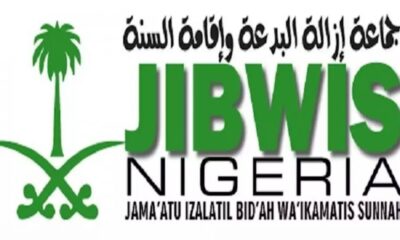
 metro8 hours ago
metro8 hours agoIslamic Scholar Barred From Ramadan Tafseer After Criticising Tinubu, Governors
-
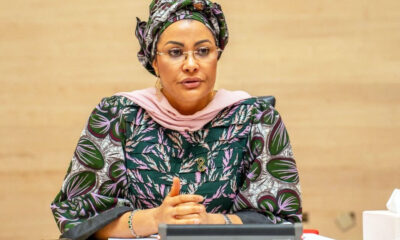
 metro1 day ago
metro1 day agoHow Ikwechegh’s ₦1.15tr Interrogation Led to Tinubu’s Cabinet Shake-Up
-
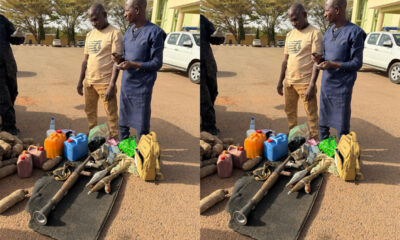
 metro2 days ago
metro2 days agoDSS Busts Alleged Arms Trafficking Network in Gombe, Seizes RPGs
-

 Politics2 days ago
Politics2 days agoAtiku’s Son Resigns as Adamawa Commissioner Following Fintiri’s APC Defection
-

 News2 days ago
News2 days agoRelief Radiant Hearts Foundation Launched in Iwo, Promises Hope for the Vulnerable
-
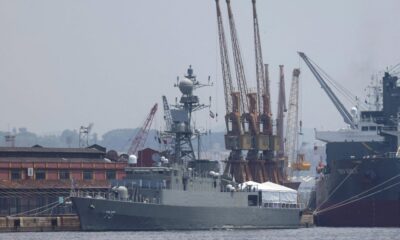
 International1 day ago
International1 day agoMystery as Iranian Warship Sinks off Sri Lanka, Over 100 Feared Missing
-

 Opinion2 days ago
Opinion2 days agoThe world dislikes the weak, by Hakeem Baba-Ahmed
-

 Sports22 hours ago
Sports22 hours agoNigeria officially out of 2026 World Cup as FIFA confirms DR Congo for play-offs









